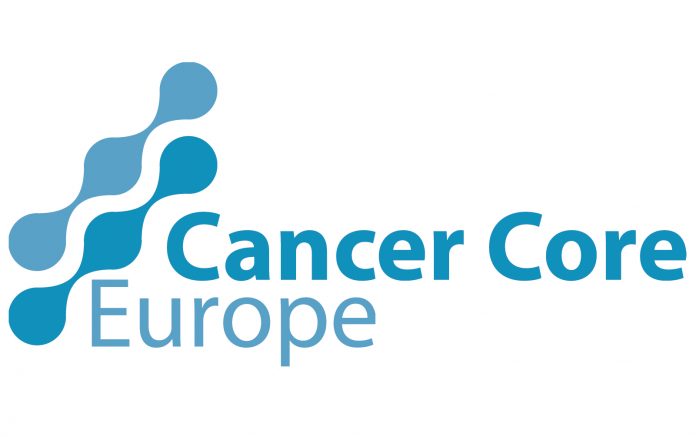By Prof. Fabien Calvo, MD, PhD
Today, cancer research is facing several challenges. The genomics era has ushered in a host of new molecular therapies; however, most of these targeted agents work for a limited subset of patients. Pooling data among centers, to analyze which sequences and combination of treatments perform best for which type of patient, is a powerful way to improve our understanding of the tumors and clinical decision-making. Furthermore, when only a few percent of patients qualify for a clinical trial, many patients must be seen. These are strong arguments for cancer centers to work together collectively.
In 2014, six centers decided to create Cancer Core Europe, and to fund a nonprofit legal association taking research in cancer medicine into a new era. Six Comprehensive Cancer Centers in six different countries are founding members of this working consortium: Cambridge Cancer Center in the UK, Karolinska Institutet in Sweden, Gustave Roussy Cancer Campus Grand Paris in France, the DKFZ and the National Center for Tumors in Heidelberg, Germany, the Netherlands Cancer Institute, NKI, in Amsterdam, and the Val d’Hebron Institute of Oncology, VHIO, in Barcelona, Spain. As a mix of both university hospitals backed by extensive basic and translational research programs and large, private cancer institutes with strong early clinical trials programs,Cancer Core Europe is large enough to see significant numbers of patients, yet small enough to minimize administrative weight to work together effectively. Altogether 60,000 new patients are seen, 1 million outpatient visits are performed and 300,000 treatments are delivered annually, and data from 1,500 ongoing clinical trials enriches joint research projects. Patients mainly have breast, lung, prostate, and colorectal tumors, but all cancer types and rare tumors are seen in large numbers in these reference centers. “Lung cancer still represents the most lethal form of cancer. To tackle this major health issue, collaborative approaches are key. Cancer Core Europe brings together different stakeholders with various strengths (clinical trial recruitment, science, imaging) to help address this issue,” says Prof. Jean- Charles Soria from Gustave Roussy.
Together, the increasingly complex molecular classification of cancers and the need for molecular/genomics information about patient tumors coupled with useful clinical data makes it nearly impossible for cancer centers to make meaningful research advances on their own—collaborative work like that being carried out by Cancer Core Europe is vital. Joint clinical trials are able to include more of the “right” patients with cancers matching the target in question. Combining various fields of expertise, Gustave Roussy (clinical trials, genomics, and immunotherapy), NCT-Heidelberg (genomics, imaging, bioinformatics, and data sharing), NKI-Amsterdam (genomics, data sharing and immunology), Cambridge Cancer Centre (clinical imaging, clinical trials, and circulating free DNA genomics), Karolinska (genomics and proteomics), and VHIO (early-phase clinical trials, and genomics) bring the entire arsenal of research tools to bear on fighting cancer.
We believe the consortium will make great strides in these areas by working together, rather than individually. Cancer Core Europe’s principal aims focus on five areas. Clearly, joint earlyphase clinical trials and data sharing are the cornerstones, and molecular diagnostics, immunotherapy, and imaging in the clinical setting complement the other two. Putting in place a data sharing platform is key; tumor genomic data, patient clinical and treatment outcomes information, as well as associated clinical images (PET, MRI, etc.) will be included. A common metadata repository with translations is the backbone to reference all of this rich data, allowing clinicians to make queries. The platform will be built in such a way that allows data owners to retain control of their data, and also respects data protection issues. We will offer robust and reproducible molecular diagnostics in all Cancer Core Europe centers that have been cross-validated, starting with a common gene panel, but moving to include tumor exome, whole genome, and circulating free tumor DNA sequencing. This will be an important tool to implement for use in joint clinical trials. A standardized immuno-monitoring program will support clinical trials research, as will the development of better patient monitoring using innovative imaging modalities. Developing an advanced training program for junior MD-PhD researchers that involves the pharmaceutical industry is also underway.
Cancer Core Europe carries out innovative research to drive the development of new treatments and earlier diagnoses for patients and more effective cancer prevention for Europe’s citizens. Starting with a small core group will allow Cancer Core Europe to set up the needed infrastructure to support the integrated basic, translational, and clinical research that is carried out. Once the foundation is firmly established, more European cancer centers will be invited to join the consortium. “Europe has unique challenges due to different countries and local organizations, but our willingness to surmount these challenges also makes the collaboration all the more important for European cancer research,” says Prof. Alexander Eggermont, Chairman of the consortium. We hope that Europe will support collaborative efforts like these in the future, since it’s a very effective way to advance research in the era of personalized medicine. ✦











